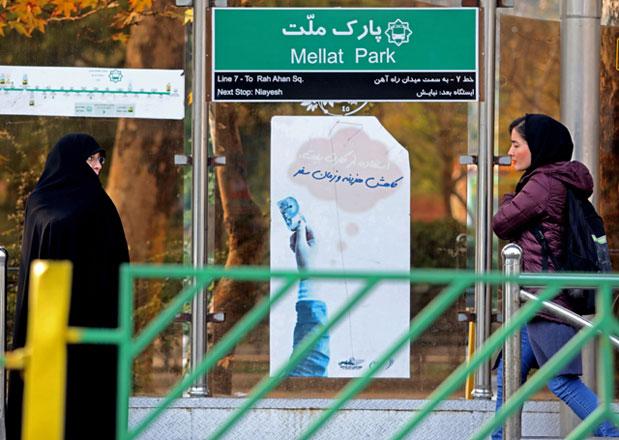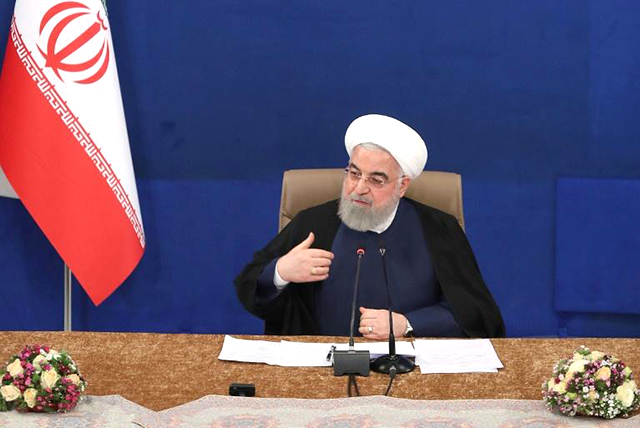You are here
Europeans cannot invoke nuclear deal dispute mechanism - Iran
By AFP - Nov 28,2019 - Last updated at Nov 28,2019

Iranian women walk past a bus station in the capital Tehran on Wednesday. Iran's supreme leader Ayatollah Ali Khamenei praised the country's people for foiling a 'very dangerous' plot after violence erupted during protests this month against a fuel price hike by as much as 200 per cent, as protesters attacked police stations, torched petrol pumps and looted shops, before being quashed within a few days (AFP photo)
TEHRAN — Iran said Thursday European parties to the 2015 nuclear deal such as France could not trigger a dispute mechanism in the agreement that could lead to UN sanctions being reimposed.
French Foreign Minister Jean-Yves Le Drian raised the possibility Wednesday of invoking the mechanism, but Iran's foreign ministry said this would not be permissible.
The deal "does not allow the European parties to invoke the mechanism as Iran is exercising its legal right in response to the United States' illegal and unilateral actions", ministry spokesman Abbas Mousavi said, quoted by semi-official news agency ISNA.
The nuclear deal — known formally as the Joint Comprehensive Plan of Action or JCPOA — has been unravelling since May 2018 when the United States unilaterally withdrew from it and began reimposing sanctions on Iran.
The three European countries still party to the deal — Britain, France and Germany — have been trying to salvage it.
But their efforts have borne little fruit, and one year after the US pullout Iran began retaliating with a series of steps to row back its commitments to the accord.
On Wednesday, Le Drian said that "every two months there is another notch [from Iran] to the extent that we are wondering today... about the implementation of the dispute resolution mechanism in the treaty".
"Given the succession of actions taken by the Iranian authorities, who are progressively at odds with the contents of the JCPOA, the question comes up," he added.
Mousavi hit out at what he called the "irresponsible and unconstructive" remarks.
"It extremely discredits the effectiveness of political initiatives for the whole implementation of the JCPOA by all sides in line with the system of lifting sanctions," he said.
“The logic and the purpose of the mechanism for resolving anticipated issues in the JCPOA is to consider compensatory measures for both sides.
“Therefore... the JCPOA doesn’t allow the European parties to invoke the mechanism against the Islamic Republic of Iran’s legal right in response to the United States’ illegal and unilateral actions,” he added.
The JCPOA set out the terms under which Iran would restrict its nuclear programme to civilian use in exchange for the lifting of western sanctions.
Since the US pullout, Iran has taken four steps back from the accord.
The latest was on November 4 when its engineers began feeding uranium hexafluoride gas into mothballed enrichment centrifuges at the underground Fordow plant south of Tehran.
Soon afterwards, Britain, France, Germany and the European Union said Iran’s decision to resume activities at Fordow was “inconsistent” with the nuclear deal.
Germany warned earlier this month that the dispute resolution mechanism in the agreement could be triggered if Iran continued down this path.
It covers various stages that could take several months to unfold, but the issue could eventually end up before the UN Security Council, which could decide to reimpose sanctions.
The five-nation commission overseeing the Iran nuclear deal is set to meet in Vienna on December 6, with fears growing that it could collapse.
The Joint Commission is made up of the three European nations and the deal’s other remaining parties, China and Russia.
Related Articles
TEHRAN — Iran's President Hassan Rouhani on Wednesday hailed the show of unity by parties to a 2015 nuclear deal, after they defeated US eff
TEHRAN — Iran's president said on Wednesday the United States made a "stupid mistake" by abandoning a nuclear deal and warned of severe cons
TEHRAN — Iran said on Monday it will only return to Vienna in order to finalise an agreement to revive its landmark 2015 nuclear deal with w

















